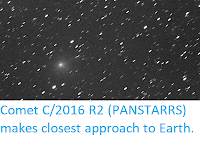Comet C/2016 T3 (PANSTARRS) makes its closest approach to the Earth
on Friday 29 January 2018 (today) reaching a distance of 2.19 AU from the
Earth
(2.19 times as far from us as the Sun, or 328 011 000 km). At this
distance the comet will not be naked eye visible, having a magnitude of 17.38, which means it would require a good telescope to observe it, and
then only in the Northern Hemisphere, as it is currently
in the
constellation of Hydra, which cannot be seen clearly from south of the Equator.
The orbit and current position of Comet C/2016 T3 (PANSTARRS) . The Sky Live 3D Solar System Simulator.
C/2016 T3 (PANSTARRS) was discovered on 10 October 2016 by the University of Hawaii's PANSTARRS telescope.
The name C/2016 T3 (PANSTARRS) implies that it is a non-periodic comet
(C/) (all comets are, strictly speaking, periodic since they all orbit
the Sun, but those with periods longer than 200 years are considered to
be non-periodic), that it was the first comet (comet 3) discovered in
the first half of October 2016 (period 2016 T) and that it was
discovered by the PANSTARRS telescope.
C/2016 T3 (PANSTARRS) has an estimated orbital period of 1708 years and a
highly eccentric
orbit tilted at an angle of 58.2° to the plain of the Solar System, that
brings it to 2.65 AU from the Sun at perihelion (265% of the distance
between the Earth and the Sun, considerably outside the orbit of Mars);
to 283 AU from the Sun at aphelion (283 times as far from the Sun as
the Earth or 9.4 times as far from the Sun as the planet Neptune, between the Kuiper Belt and the Oort Cloud.
See also...
See also...
Follow Sciency Thoughts on Facebook.







